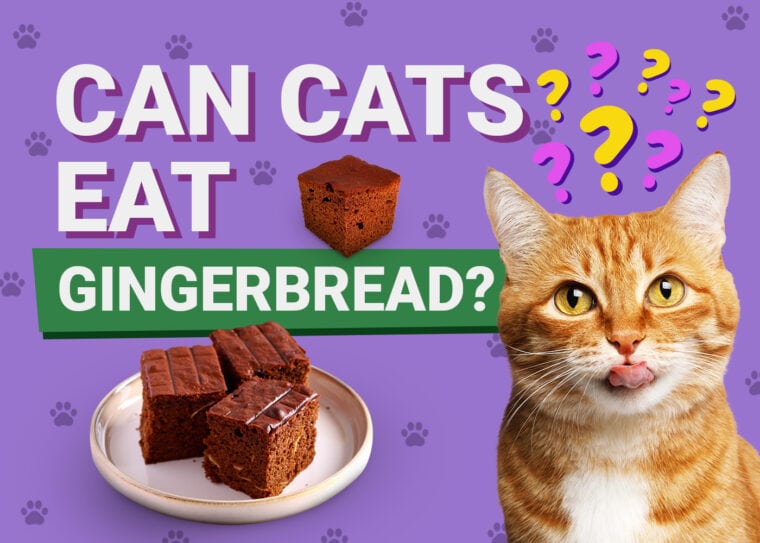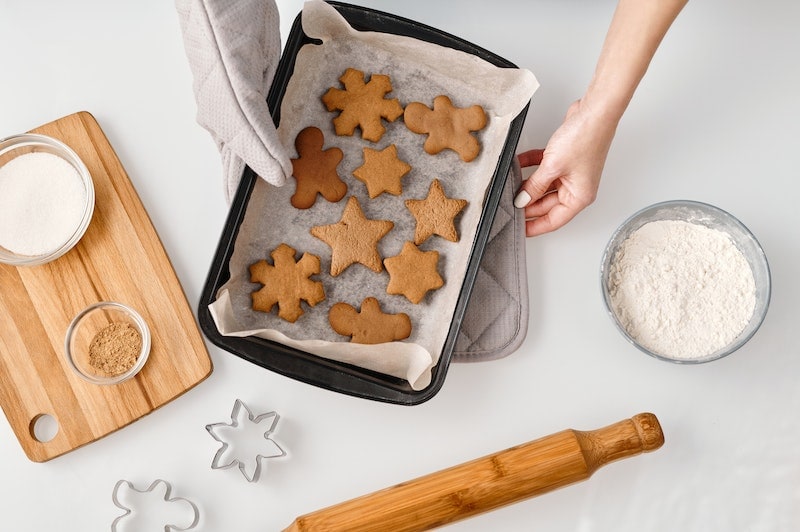
Gingerbread is one of the most popular treats to make at home, especially during the holiday season. While ginger on its own is used by humans to fight nausea, inflammation, and other health issues, gingerbread should be avoided in cats. It contains sugar, spices, and herbs that can be toxic to cats.
Here, we explain why gingerbread is so dangerous for cats and provide a few alternative treat ideas to try.
Can Cats Eat Ginger?
Ginger is commonly used in herbal and traditional medicines in China and western countries, as well as in cooking. It’s used to settle upset stomachs, stimulate the circulatory system, support brain health, and reduce inflammation. Although there are only limited studies on the effectiveness of ginger when it comes to pets, it is often used as a dietary supplement for cats and dogs.
Follow your veterinarian’s recommendations on the use of ginger for your cat.

Can Cats Eat Gingerbread?
No. Just because gingerbread contains ginger, which is safe for cats, that doesn’t mean it’s safe for them. Gingerbread contains many other ingredients that are dangerous for cats to eat, and it’s much safer for you to give them cat-safe treats instead.
Fortunately, none of these ingredients are toxic enough to harm your cat if they have a tiny amount of gingerbread. In large quantities, though, they can cause a range of health problems, like gastrointestinal issues, pancreatitis, obesity, liver toxicity, and seizures. Here’s a rundown of common ingredients in gingerbread that are toxic to cats.
Ingredients in Gingerbread that are Toxic to Cats
Cinnamon
Cinnamon is a popular seasoning for all sorts of desserts. While the ASPCA lists cinnamon as non-toxic there are some concerns that it could be toxic in large amounts due to the compound coumarin.
Cinnamon toxicity is caused when your cat eats too much cinnamon or when they’re exposed to cinnamon oil, which is highly toxic and should be avoided. It can cause low blood sugar, liver toxicity, vomiting, diarrhea, and arrhythmia.
Cloves
Another favorite ingredient to add to gingerbread recipes is cloves. For cats, clove oil or whole cloves are the most dangerous, but eating too much gingerbread can also be a problem. Cloves contain eugenols, which are compounds that can cause liver toxicity, vomiting, tremors, and seizures in cats.
Egg

If you make gingerbread at home, you need to consider the dangers of the raw batter, especially if you leave the kitchen unattended for any amount of time or your cat gets their paws on the used mixing bowl.
When cooked, eggs are safe and nutritional treats for your cat. However, the raw egg used when you prepare a batch of gingerbread cookies isn’t. Cats are susceptible to getting infected by salmonella bacteria just like we are and can even pass it on to you. Raw eggs increase the risk of you and your cat suffering from salmonella poisoning.
Nutmeg
Nutmeg can be found in many baked treats, including gingerbread. Like the other ingredients in gingerbread, the tiny amount used might not hurt your cat, but larger amounts will. For example, your cat might decide to investigate the jar of nutmeg that you’re about to add to your homemade cookies.
Nutmeg contains myristicin, which can cause stomach aches, increased heart rate, high blood pressure, hallucinations, disorientation, dry mouth, and seizures.
Sugar
Sugar is included in most baked treats. For gingerbread, sugar can be found in the gingerbread itself and any icing used for the decorations. While sugar isn’t toxic like the other ingredients, it’s not healthy for cats either.
Sugar ingested by cats can cause diarrhea, vomiting, and stomach aches. Over time, it can lead to obesity.
Xylitol
Sweeteners like xylitol are used in sugar-free foods—like sugar-free gingerbread or icing—and it’s not great for pets. While dogs are more well-known for having a severe reaction to xylitol, it’s not recommended for cats either, and you should avoid it just in case.

What to Do If Your Cat Eats Gingerbread
Most of the time, your cat is likely to only eat a bit of your gingerbread. A crumb or two or a tiny piece isn’t likely to cause much of a problem. The risk comes when your cat eats a large amount of gingerbread. If your cat does eat any gingerbread, though, keep a close eye on them so you can spot any adverse reactions.
Hopefully, your cat didn’t eat much and only has to deal with an upset stomach for a few hours while they digest the cookie. If your cat eats a large amount of gingerbread or has a serious reaction, take them to your veterinarian immediately. Warning signs to look for include:

Alternatives to Gingerbread for Cats
Feeding a pet a piece of their snack is what many owners do to share their love. A treat like this every now and then isn’t a bad thing, but many people assume that food is the only way to show cats their love.
When it comes to the dangers of human food, though, constant treats are never a good idea. Even proper cat treats aren’t great in excess. There are plenty of other ways to show that you care.
Try introducing your cat to catnip to see if they enjoy the short euphoria, or make a DIY cat toy so you can play together. You can also reuse old boxes to make a cat castle so they have a peaceful place to nap. It’ll be much easier to keep them healthy when you keep the treats for special occasions.
Knowing exactly what your feline companion can and cannot eat will help you become the best pet parent. Recognizing that not all cat bowls are equal is also key! The Hepper NomNom Cat Bowl sets itself apart from traditional options by catering to the specific needs of cats. The innovative design offers whisker relief via shallow dishes and promotes digestion with a slight bowl elevation. Find out if the Hepper NomNom is right for your cat by clicking here.
At Pet Keen, we’ve admired Hepper for many years and decided to take a controlling ownership interest so that we could benefit from the outstanding designs of this cool cat company!
Conclusion
Traditionally used in Chinese and Western medicine, ginger is frequently used in pet medicine to settle upset stomachs and alleviate the symptoms of cancer treatment. However, while ginger alone isn’t harmful to cats, the baked goods that use it can be toxic due to the other ingredients involved.
Gingerbread, despite being a favorite holiday treat, can be dangerous for cats to eat. It might include a healthy dose of ginger, but it also has cinnamon, cloves, and nutmeg, all of which are potentially toxic to cats.
To keep your cat safe, bake them special ginger biscuits by following pet-safe recipes that your veterinarian recommends. For the best results, though, stick with tried-and-tested cat treats that you can buy from your local pet store.
Related Reads:
- Can Cats Eat Apple Pie? (Vet Reviewed Nutrition Facts)
- Can Cats Eat Rice Krispies? Vet Reviewed Facts & FAQ
- Can Cats Have Cinnamon? Vet-Reviewed Facts & FAQ
Featured Image Credit: Soloviova Liudmyla, Shutterstock








